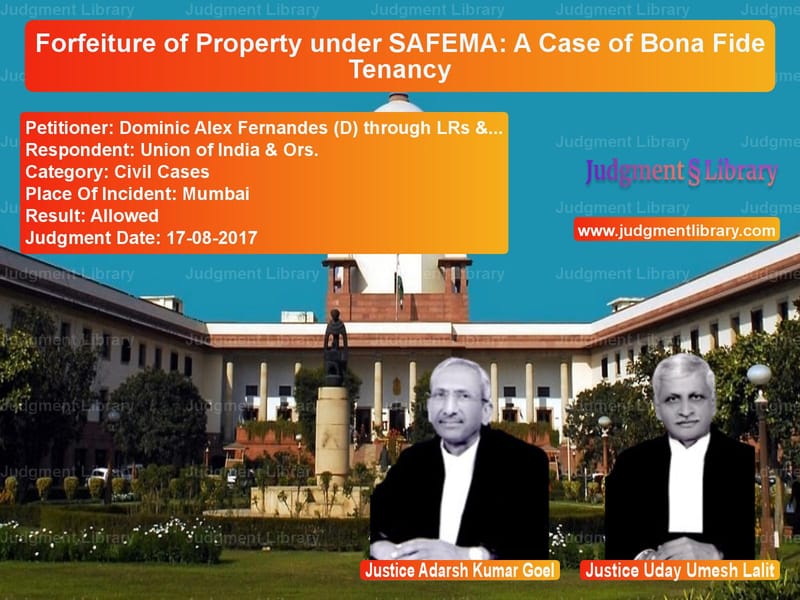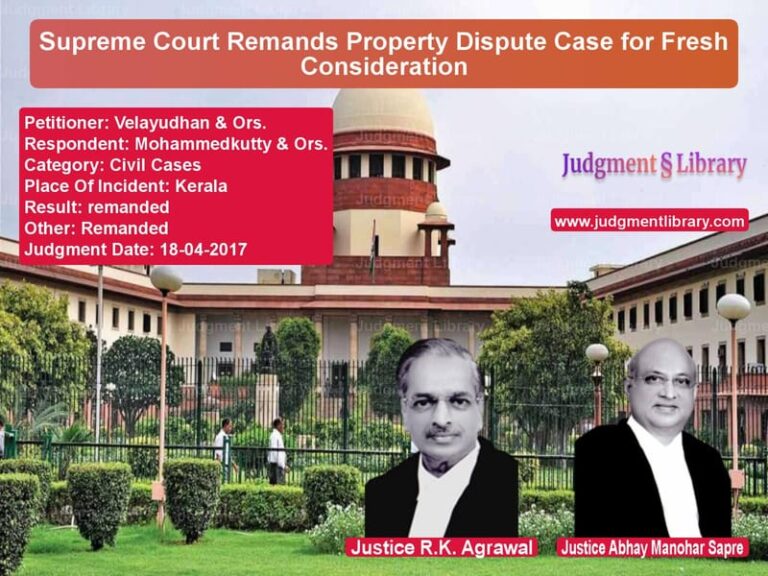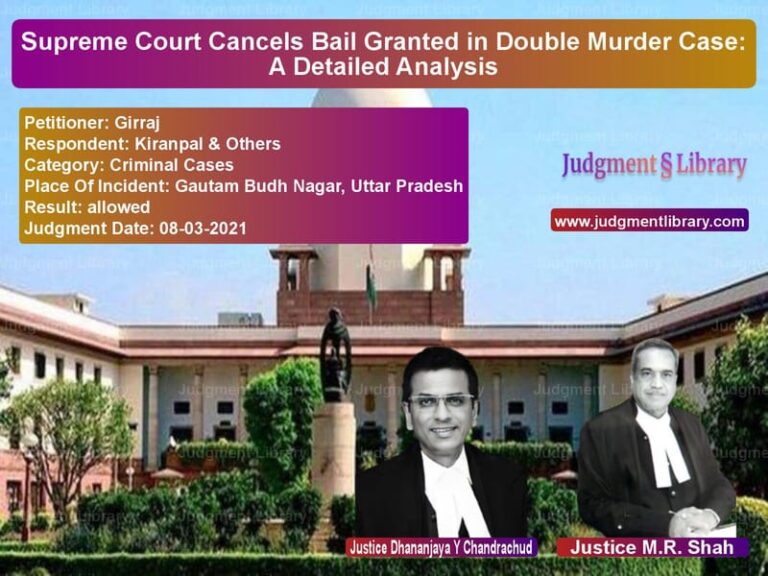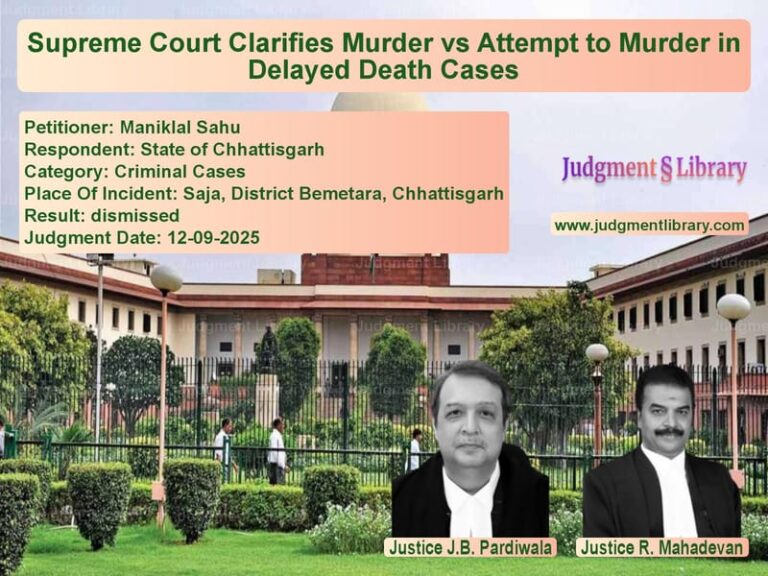Forfeiture of Property under SAFEMA: A Case of Bona Fide Tenancy
This case revolves around the appeal filed by Dominic Alex Fernandes (Appellant), representing the legal heirs, against the Union of India and others (Respondents), concerning the forfeiture of property under the Smugglers and Foreign Exchange Manipulators (Forfeiture of Property) Act (SAFEMA), 1976. The central issue was whether the forfeiture of property under SAFEMA applies to bona fide tenants of the property in question, where the property was earlier acquired by an individual whose actions were in violation of the law.
Background: The property in dispute, located at T-40, Juhu Koliwada, Santacruz (West), Mumbai, was originally owned by Krishna Budha Gawde, who was detained under the Conservation of Foreign Exchange and Prevention of Smuggling Activities Act (COFEPOSA). His detention led to the invocation of SAFEMA, as he was deemed a person whose property had been acquired through illegal means. As a result, the property was ordered to be forfeited by the competent authority under Section 7 of SAFEMA. However, the appellants, who were bona fide tenants of the property before its acquisition by Gawde, challenged the forfeiture order, claiming that their tenancy rights should not be automatically terminated by the forfeiture of the property.
The appellants had been tenants of the property before its purchase by Gawde in 1965, and they continued to occupy the property, paying rent as per the Bombay Rent Act. They were unaware of the proceedings under SAFEMA and COFEPOSA against Gawde, which led them to seek legal protection from the forfeiture order. The case raised critical questions about the rights of bona fide tenants when the property is forfeited by the government due to the owner’s unlawful actions.
Petitioner’s Argument: The appellants argued that they were bona fide tenants of the property and had no connection with the illegal activities of Krishna Budha Gawde. They emphasized that the forfeiture of the property should not affect their tenancy rights, as they had been paying rent and had no involvement in the unlawful actions of the previous owner. They further argued that their tenancy rights were protected under the Bombay Rent Act and should not be extinguished due to the forfeiture of the property. The appellants also pointed out that they were unaware of any illegal activities related to the property, and thus, they should not be penalized for the actions of their landlord.
Respondent’s Argument: The respondents, represented by the Union of India, contended that once the property was forfeited under SAFEMA, the rights of all persons associated with the property, including tenants, would cease to exist. They argued that the purpose of SAFEMA was to ensure that properties acquired through illegal means would be forfeited and vested in the central government. The respondents maintained that the appellants’ claim to continue occupying the property as tenants was untenable, as the property had been deemed illegally acquired, and any tenancy rights associated with the property were automatically extinguished by the forfeiture order. They relied on the provisions of Section 7(3) of SAFEMA, which stated that forfeiture would extinguish all rights, including tenancy rights, of individuals associated with the property.
Court’s Ruling: The Supreme Court, after considering the arguments of both parties, ruled in favor of the appellants, setting aside the order of the High Court. The Court held that the rights of bona fide tenants would not be automatically extinguished by the forfeiture of property under SAFEMA. The Court observed that the purpose of SAFEMA was to forfeit properties that were acquired through illegal means by the person to whom the Act applied, but it did not extend to forfeiting the rights of bona fide tenants who had no involvement in the illegal acquisition of the property. The Court emphasized that the forfeiture order applied to the original owner and those who had direct involvement in the illegal activities, not to tenants who were merely occupying the property in good faith.
Key Points from the Judgment:
- The Court ruled that bona fide tenants of a property are not automatically deprived of their tenancy rights when the property is forfeited under SAFEMA, as long as they are not linked to the illegal activities of the previous owner.
- The forfeiture order applies only to the original owner and those who have direct involvement in illegal activities, not to bona fide tenants who were in lawful occupation of the property.
- The Court set aside the order of the High Court and allowed the appellants to continue their claim for tenancy rights, as their rights were not extinguished by the forfeiture of the property.
- The judgment emphasized the need for a direct link between the forfeited property and the illegal actions of the individual to whom the Act applied, excluding innocent third parties such as tenants from the scope of forfeiture.
- The Court directed the matter to be remitted to the competent authority for further proceedings in accordance with the law.
Conclusion: This case underscores the protection of the rights of bona fide tenants, even when the property they occupy is forfeited by the government due to the unlawful activities of the previous owner. The Court’s ruling reaffirms that the forfeiture provisions of SAFEMA are intended to target the illegal activities of the property owner and not the rights of innocent tenants. The judgment serves as an important precedent in the interpretation of tenancy rights in the context of property forfeiture and highlights the need for a fair legal process that does not unjustly penalize tenants who are not involved in the unlawful actions of the property owner.
Don’t miss out on the full details! Download the complete judgment in PDF format below and gain valuable insights instantly!
Download Judgment: Dominic Alex Fernand vs Union of India & Ors Supreme Court of India Judgment Dated 17-08-2017.pdf
Direct Downlaod Judgment: Direct downlaod this Judgment
See all petitions in Contract Disputes
See all petitions in Property Disputes
See all petitions in Specific Performance
See all petitions in Judgment by Adarsh Kumar Goel
See all petitions in Judgment by Uday Umesh Lalit
See all petitions in allowed
See all petitions in supreme court of India judgments August 2017
See all petitions in 2017 judgments
See all posts in Civil Cases Category
See all allowed petitions in Civil Cases Category
See all Dismissed petitions in Civil Cases Category
See all partially allowed petitions in Civil Cases Category







